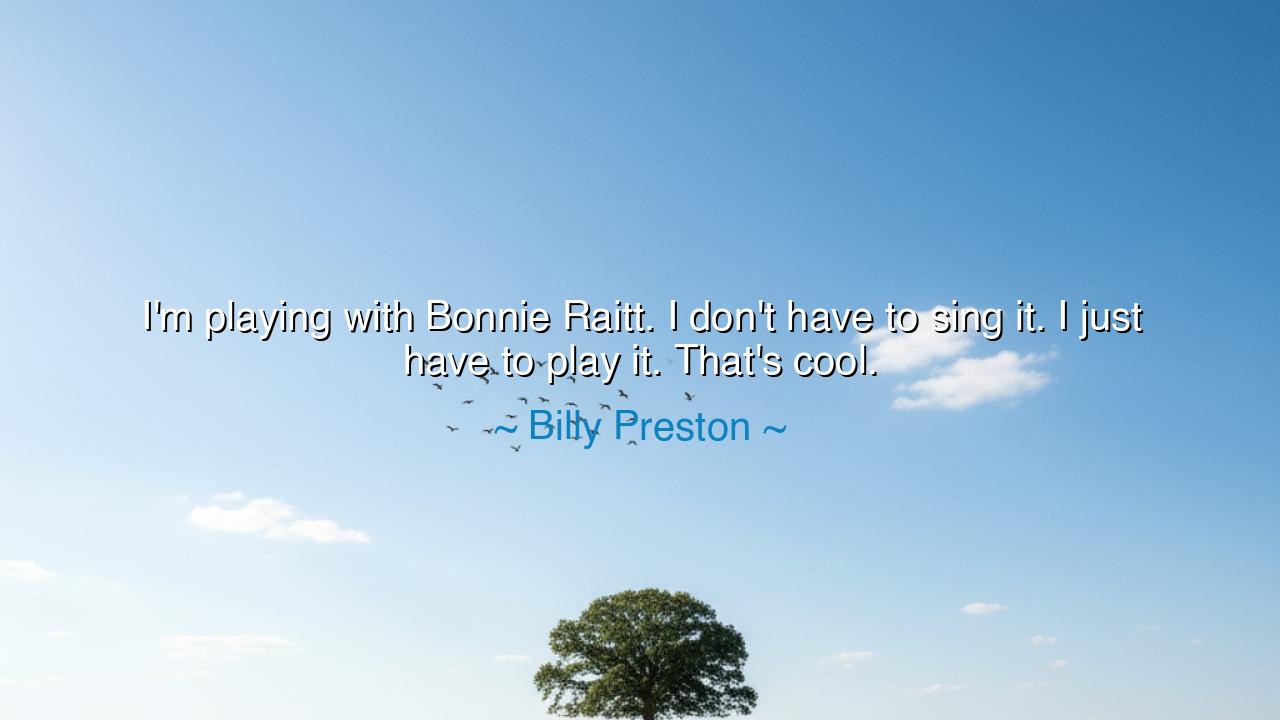
I'm playing with Bonnie Raitt. I don't have to sing it. I just
I'm playing with Bonnie Raitt. I don't have to sing it. I just have to play it. That's cool.






"I'm playing with Bonnie Raitt. I don't have to sing it. I just have to play it. That's cool." These words spoken by Billy Preston reveal a profound understanding of humility, mastery, and the joy found in collaboration. In this simple statement, Preston acknowledges the beauty of contributing to something greater than himself, where the act of playing becomes as meaningful as the act of singing. His humility is evident in his recognition that, while Bonnie Raitt may take the spotlight as the singer, his role as the musician—the one who provides the foundation of the sound—is just as vital. There is power in playing a part without seeking the glory or recognition that might come with being the one in front of the audience. Preston speaks to the joy that can be found in embracing one’s role without the need for personal validation.
In ancient times, the greatest warriors, philosophers, and artists understood the importance of collaboration and humility in achieving something far greater than the individual. Homer, in his epic poem The Iliad, tells of a great hero, Achilles, whose strength on the battlefield was unmatched. Yet, the troops depended not only on Achilles but on all the warriors working together for a common cause. Achilles’ victory was tied to the collective, for no man could succeed alone. Even the greatest philosophers like Socrates or Plato acknowledged that their wisdom was built upon the teachings of their predecessors, recognizing that no individual could claim all the wisdom of the world. They were always part of a larger story—and so too is Billy Preston in his contribution to the music world. His role may have been behind the scenes, but it was equally essential to the whole experience.
Preston’s statement also speaks to the art of mastery—the ability to step back, recognize one’s strength, and contribute without the need to overshadow others. The ancient craftsmen and builders of civilizations, from the grand pyramids of Egypt to the majestic Parthenon in Greece, were not seeking the spotlight of fame. They crafted their masterpieces with skill, pride, and dedication, knowing that their work would be recognized by future generations, not for their individual glory, but for the greatness of their contribution. Much like Preston, they understood that mastery in any field—whether music, art, or architecture—often comes from the ability to serve a larger vision and to contribute without ego.
Billy Preston’s role in the Beatles and his collaboration with artists like Bonnie Raitt reminds us that there is honor in supporting others in their journey. Just as the sun’s light enables the growth of plants, but does not claim the credit for the beauty of the bloom, Preston’s contribution was a catalyst—not the center, but the source of the beauty and depth in the music. He did not need to sing the song to make it powerful. His playing was the essence, the thread that connected the whole. This idea of service through skill is not only a noble pursuit but also one that brings inner fulfillment, as it allows the artist to work for the greater good rather than for personal acclaim.
Consider the story of the Renaissance, when artists like Michelangelo and Leonardo da Vinci were celebrated not just for their individual brilliance, but for their role in the collaborative works they undertook. Michelangelo, though often remembered for his sculptures and paintings, was deeply involved in the architectural projects of the Vatican. His role was not only to create stunning works of art but to bring together the talents of a team, creating something greater than any single individual could have achieved. Preston’s sentiment mirrors this—he understood that sometimes, the act of contributing to a greater cause requires setting aside ego and recognizing the importance of the whole. It is in humility and collaboration that we find the true strength of any creation.
The lesson here is clear: there is greatness in contributing to the whole without the need to claim the spotlight for oneself. Preston teaches us that sometimes the most powerful and meaningful roles are those played from the background—roles that are vital, yet humble. The music, like any art or creation, is a collective endeavor, and each instrument—whether it be guitar, drums, or keyboard—serves to elevate the whole piece. So, too, must we approach our own lives with humility and a sense of purpose, knowing that our greatest contributions often come when we serve others without the need for recognition.
In our own lives, let us embrace the wisdom of Billy Preston, recognizing that our value does not lie in seeking the spotlight, but in contributing to something larger than ourselves. Whether we are musicians, builders, thinkers, or workers, the greatest satisfaction comes not from the applause we receive, but from the joy of playing our part in the symphony of life. Let us step back from ego, step into our roles, and offer our best to the greater good, knowing that, just like Preston, we are essential to the whole. True greatness lies not in seeking to be the lead, but in recognizing the power of being part of something greater.






AAdministratorAdministrator
Welcome, honored guests. Please leave a comment, we will respond soon